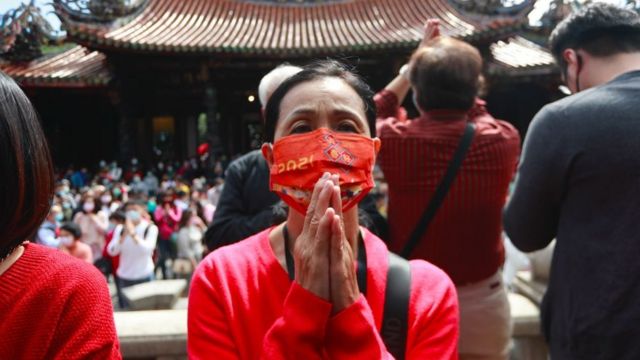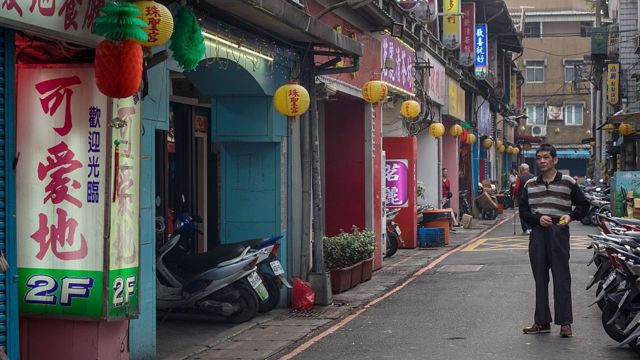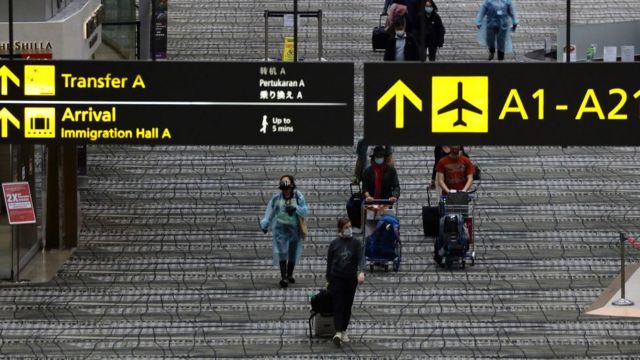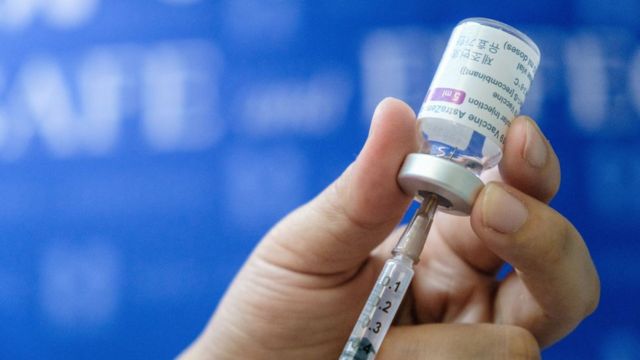Covid: why Taiwan and Singapore live high from infections, after being seen as examples of success
They were extolled as success stories against the coronavirus, and recorded almost no cases of covid-19 in early 2021.
But this month, Singapore and Taiwan faced a sudden and aggressive increase in the number of infections. The first had 248 new cases last week, and the second, 1,200.
For international standards (Brazil has almost 80 thousand a day), these numbers may seem insignificant. But for these countries they were unthinkable months ago. What went wrong, anyway?
A case of complacency: Taiwan
Taiwan was one of the first places to ban foreign tourists as soon as China reported the emergence of the virus in late 2019, and these tough border restrictions remain in place today.
Hospitals have stopped massively testing people for covid, even those with fever, one of the most common symptoms of coronavirus
According to the University of Oxford's Our World in Data portal, Taiwan performed only 0.57 virus tests per 1,000 people in mid-February. In comparison, Singapore had 6.21 and the United Kingdom, 8.68.
Taiwan's red light district, filled with tea houses and massage parlors
"There was a general assumption, even with people showing symptoms, that the likelihood of having covid-19 was essentially zero," Associate Professor Lin Hsien-ho of the National Taiwan University told the BBC, adding that it stemmed from the belief that the virus could not cross the strong barriers raised by Taiwan.
"Doctors weren't taking this seriously, hospitals weren't alert, they didn't do a lot of contact tracking. There was definitely a sense of complacency."
This was especially true when Taiwan relaxed its quarantine requirements for unvaccinated airline pilots from 14 to 5 days. And then for only 3 days.
Shortly thereafter, a series of cases emerged connected to a group of China Airlines pilots who were staying at a hotel near Taoyuan airport. Later, I found out that many of the infected people linked to this case series had contracted the variant found in the United Kingdom, known as B.1.1.7.
The virus then spread through the community, reaching Taiwan's "tea houses", which are entertainment venues for adults.
"You had people singing, drinking, making frequent contact in a not very ventilated indoor environment. It wasn't just a teahouse, but many on the same street. It was a huge spreading event," said Lin, from Taiwan National University .
Professor Chen Chien-jen, an epidemiologist and former vice president of Taiwan, says that the fact that many of those who have been diagnosed positively do not want to declare that they have visited these adult entertainment venues has made it even more difficult to track down the people with whom they have found.
"It just reminds us that even when a very small proportion of the population breaks the rules, it will lead to escapes," said Dr. Chen.
He also adds that Taiwan has failed to learn from Japan's adult entertainment industry, which was also a focus of infections at one point.
"We didn't learn our lesson from Japan and we reflected that Taiwan could have these same problems," he said.
According to Professor Alex Cook, of the National University of Singapore (NUS), the situation in Taiwan is "a reflection of the constant risk of a strategy that places too much emphasis on border control and not enough in measures to prevent dissemination within the country" .
Cracks in the wall: Singapore
In Singapore, however, the story was different.
The measures in the country have always been strict, despite the few cases recorded during the pandemic. Public meetings can gather up to eight people, the night clubs have not reopened and there is still a limit for collective meetings, such as weddings.
But there were still gaps in its vaccine strategy, and by the end of May, Singapore's Changi Airport, which also has a popular shopping center, had become the country's largest covid center in 2021.
Singapore airport has become a spread point for covid-19
Later, Singapore officials found that several infected airport employees were working in an area that welcomed travelers from high-risk countries, including those in South Asia.
Some of these employees started to eat in the airport's food courts, which are open to the public, spreading the virus even more.
As a result, the country decided to close its passenger terminals to the public.
Later, it was discovered that many of those infected had a highly contagious variant that was discovered in India, known as B.1.617.
Singapore also announced that it would separate flights and passengers from high-risk countries and regions from those arriving from lower-risk places. Staff will also be segregated by zones.
Many in the country wonder why such measures have not been taken before, noting that these loopholes were pointed out weeks ago.
But experts say it was "inevitable" for a new variant to arrive in the country.
"I understand why people are feeling frustrated because most Singaporeans have been extremely accommodating," said Professor Teo Yik Ying, dean of the School of Public Health (NUS).
"But we are not like China, which manages to keep its borders completely closed. Our reputation as a country, our economy, is linked to our position as a commercial center. Furthermore, if we look at the United States last year, its worst cases of viruses did not come from China, but from travelers from Europe. So, how many countries can Singapore close its borders to? "
But Cook, of the National University of Singapore, says the country is still in a "very good position" to contain its outbreak.
"I hesitate to say that 'things have gone wrong', since Singapore is still, despite the intensification of the measures, in a very good position," he said.
"If you compare it to the UK, typical daily cases are about 10% of the UK level if you consider the population size proportionately. In other words, Singapore is tightening up measures to prevent reaching a point where the virus can get out of control. "
Slow vaccination
There is a problem that affects Singapore and Taiwan equally: vaccine.
Many in Taiwan did not want to get the vaccine when things were going well, with fears surrounding the possible side effects of the AstraZeneca-Oxford vaccine, the main vaccine available in the country, which further increased vaccine hesitation.
The current increase in cases, however, has changed that, and people in Taiwan are now crowding to receive the vaccine. But the problem is: there are no doses for everyone.
So far, Taiwan has received only 300,000 vaccines, compared to its population of 24 million.
"We tried our best to buy vaccines from international companies, but we didn't get much. The only way to sustain our supply is to manufacture it ourselves, this is very important for Taiwan," said Chen, former vice president of Taiwan.
Many in Taiwan avoided receiving AstraZeneca-Oxford vaccine for fear of side effects, but later lined up when cases increased in the country
Taiwan is currently working on the production of two local vaccines, which may be available in late July.
The story is a little different in Singapore, but it suffers from the same scarcity.
About 30% of the population received at least one dose of the vaccine, according to the University of Oxford, and this represents the highest rate of vaccination in Southeast Asia. But the country has its hands tied with the limited supply of vaccines. In any case, the government expects to vaccinate its entire population by the end of the year.
"Ultimately, we are limited by supply. In countries like the UK, USA, China, they have the ability to produce their own vaccines," said Teo, from the Singapore School of Public Health.
"We anticipate that the need for vaccines will be long-term, so we are moving towards having our own manufacturing capabilities. So we will no longer be dependent."
Teo adds that the peak in both places is a lesson for countries that may now be seeing a drop in cases.
"When we see countries in Europe or the United States starting to relax measures to restrict the movement of people, I think they should be very cautious and look around the world to see what is going on," he said.
"What happened in Taiwan and Singapore is a sign that we must not let our guard down."




No comments:
Post a Comment